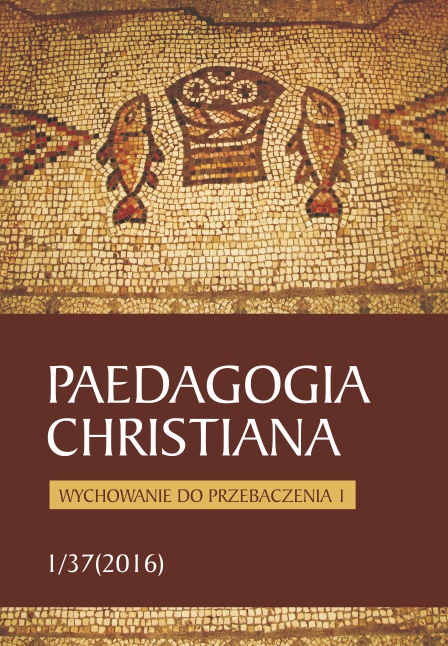Forgiving the Harm as an Act of Mercy
DOI:
https://doi.org/10.12775/PCh.2016.011Keywords
forgiveness, harm, mercy, Focolare Movement, spiritual works of mercyAbstract
The article discusses the issues of moulding a human ability of forgiving the harms. The point of departure is the contents of one of the “spiritual works of mercy” expressed in the imperative: “to bear wrongs patiently”, which in Italian goes: “forgive the wrongs”. A harm is a consequence of deed directed against human dignity. This kind of deed is always harmful and the harm requires healing. This process is completed in forgiveness. The author sees the ability of forgiving as a significant regulator of interpersonal relations, starting with these most basic (family) and ending with more complex ones (different types of groups, communities, nations). In his search for the model of forgiveness, the author reaches to the Holy Scripture and the experience of the Gift of Unity by Chiara Lubich, showing forgiveness from the theological perspective. He also offers an act of loving and pact of mercy as specific educational tools in relation to forgiveness, introducing them as applicable also among believers of other religions and non-religious people.References
Accattoli, Luigi. Kiedy Papież prosi o przebaczenie. Wszystkie „mea culpa” Jana Pawła II. Kraków: Wydawnictwo Znak, 1999.
Accattoli, Luigi. Quando il Papa chiede perdono. Tutti i mea culpa di Giovanni Paolo II. Milano: Mondadori, 1999.
Bartłomiej. „Komentarz do Via Crucis Koloseum, 1 kwietnia 1994”. L’Osservatore Romano 3.4 (1994): 7.
Blaumeiser, Hubertus. „Un mediatore che è nulla”. Nuova Umanità 3-4 (1998): 385-407.
Brambilla, Franco G. „L’onda del rinnovamento. Rimettere al centro il primato di Dio. La radice del Vaticano II”, Il Regno attualità 11(2015): 715-719.
Francesco. Il nome di Dio è Misericordia. Milano: PIEMME, 2016.
Franciszek. Bulla Misericordiae Vultus Ojca Świętego Franciszka o nadzwyczajnym jubileuszu miłosierdzia. Wrocław: Wydawnictwo TUM, 2015.
Franciszek. Miłosierdzie, to imię Boga. Kraków: Wydawnictwo Znak, 2016.
Franciszek. Papież w Ciudad Juárez: więzienia są oznaką tego, jacy jesteśmy jako społeczeństwo. http://www.deon.pl/religia/serwis-papieski/dokumenty/przemowienia-papieskie/art,126,papiez-w-ciudad-jurez-wiezienia-sa-oznaka-tego-jacy-jestesmy-jako-spoleczenstwo.html?utm_source=deon&utm_medium=link_artykul.
Jan Paweł II. Novo millennio ineunte. Poznań: Pallotinum, 2001.
Katechizm Kościoła katolickiego. Poznań: Pallotinum, 2002.
Lubich, Chiara. Charyzmat jedności. Kraków: Fundacja Mariapoli, Wydawnictwo M, 2007.
Lubich, Chiara. Jedność, red. Donato Falmi, Florence Gillet. Warszawa: Fundacja Mariapoli, 2016.
Lubich, Chiara. Krzyk opuszczenia. Kraków: Fundacja Mariapoli, 2001.
Lubich, Chiara. L’arte di amare. Roma: Città Nuova, 2005.
Lubich, Chiara. „Paradiso ’49”. W: AA. VV., Il Patto del ’49 nell’esperienza di Chiara Lubich. Roma: Città Nuova, 2012.
„Messaggio del Santo Papa Francesco a firma del Cardinale Piero Parolin, in occasione del XXXV Metting per l’amicizia fra i popoli, inviato a S.E. Francesco Lambiasi, vescovi di Rimini”. W: Le periferie dell’umano, red. Emanuela Belloni, Alberto Savorana. Milano: RCS, 2014.
Nouwen, Henri. L’abbraccio benedicente. Meditazione sul ritorno del figliol prodigo. Brescia: Queriniana, 1994.
Papieska Rada Iustitia et Pax. Kompendium nauki społecznej Kościoła. Kielce: Jedność, 2005.
Rifkin, Jeremy. La civiltà dell’empatia. Torino: Einaudi, 2010.
Scheler, Max. Essenza e forme della simpatia. Milano: Franco Angeli, 2010.
Scheler, Max. Istota i formy sympatii. Warszawa: Państwowe Wydawnictwo Naukowe, 1980.
Stein, Edith. Il problema dell’empatia. Roma: Studium, 2012.
Stein, Edith. O zagadnieniu wczucia. Kraków: Wydawnictwo Znak, 1988.
Downloads
Published
How to Cite
Issue
Section
Stats
Number of views and downloads: 839
Number of citations: 0



